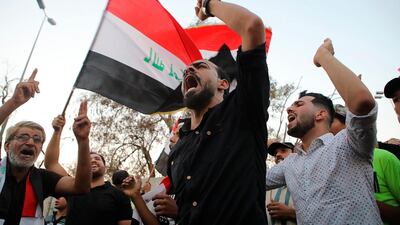Iraq's government is facing renewed pressure from the southern city of Basra to provide adequate public services, with nearly 120,000 people admitted to hospital with water poisoning.
The oil hub has seen growing public anger over poor infrastructure, contaminated water and lack of jobs in a region that generates the majority of the country's oil wealth.
"The renewed calls for protests are more about economic worries than political grievances, we are concerned about the new government's inability to provide public services such as water, electricity and employment opportunities," Mohammed Al Tai, a former member of parliament for Basra, told The National on Thursday.
Dozens of demonstrators have died since protests broke out in July, and several nights of violence in September saw public buildings and the Iranian consulate torched in Basra city.
"We will ensure that dictatorship is combated in the country. Basra's citizens are calling for their rights to education, employment or we will revolt," Mr Al Tai said.
In addition, tribes in the southern province say they are under-represented in the country's new government. They have also denounced what they perceive as Iran's control over Baghdad's affairs.
"We are preparing to launch demonstrations in Basra in order to ensure that the promises of the previous government are fulfilled, but we fear that our voices may not be heard," Ahmed Al Ali, a resident of Basra, told The National.
The calls comes days after newly appointed Prime Minister Adel Abdul Mahdi took office.
As well as water shortages and contamination, Basra is now threatened by a cholera outbreak, according to health officials. Hospitals have already treated more 118,000 people for chronic diarrhoea and other stomach ailments as a result of drinking polluted water, according to the Iraq Human Rights Committee.
_______________
Read more:
Iraq lawmakers confirm new government but key posts are left empty
Basra: almost 300,000 children at risk of waterborne diseases
_______________
Residents and politicians say it is a symptom of the breakdown in public services caused by corruption and years of neglect by the central government in Baghdad.
The collapse of sanitary facilities in Basra's schools has put more than 277,000 children in danger, according to the non-profit Norwegian Refugee Council.
"The situation in schools reflects the situation in the city," said NRC's media coordinator in Iraq, Tom Peyre-Costa. "It's even worse in schools because of the high concentration of children in overcrowded platforms - the risk of transmission is even higher," he told The National.
The water crisis has also forced nearly 4,000 people to leave their homes in rural areas, according to the agency.

